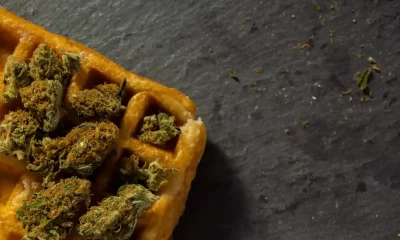Business
Singapore Hangs Man Over One Kilo of Weed

Forty-six year old Tangaraju Suppiah was executed at dawn on Wednesday in Singapore.
Singapore officials executed a man today—by hanging—who was found guilty of drug trafficking a kilogram of cannabis into the country.
NDTV in India reports that Tangaraju Suppiah, 46, was executed at dawn on Wednesday, rejecting a growing chorus of anti-death penalty campaigners to end the country’s cruel use of capital punishment.
British billionaire Sir Richard Branson, a long opponent of the death penalty, and a group of world leaders called for action for what they describe as a disturbing case of what may be an innocent man.
Branson wrote a detailed blog post pleading for mercy, while The European Union (EU) and Australian MP Graham Perrett issued statements in defense of the man. The EU statement, jointly issued on April 24 with the diplomatic missions of EU member states Norway and Switzerland, called on authorities to halt Tangaraju’s execution and commute his sentence to a non-capital sentence.
Parrett was noticeably disgusted by the choice of punishment.
“Imagine being hanged by the neck until you are dead because of a bit of dope,” Parrett tweeted in a series of posts. “This is the fate that awaits Tangaraju Suppiah of Singapore. Yesterday Tangaraju’s family were delivered his execution notice that announced he would be hanged the day after ANZAC Day.” (Anzac Day is Australia’s Memorial Day.)
Tangaraju was sentenced to death on October 9, 2018, for attempting to traffic more than 1 kilogram of cannabis to Singapore. He was originally detained in 2014 for drug consumption and failure to report for a drug test.
Tangaraju was held at Singapore’s Changi Prison Complex in the eastern part of the city.
Branson argued that “the system is broken beyond repair.” He contends that in the U.S. alone, nearly 190 people have been exonerated and freed from death row since 1976. Branson also tried to free “drug trafficker” Nagaenthran Dharmalingam, who was executed by hanging in 2022. Branson was invited to take part in a live televised debate with the city state’s home affairs minister K. Shanmugam, but declined to do so.
In 1994, an American 19-year-old was caned in Singapore for graffiti, left in a bloody mess. Drug laws are similar. “Drug traffickers are less likely to traffic drugs and reduce the amount of drugs trafficked if they are aware of the penalties involved,” the Singapore MHA claims, referring to its use of capital punishment by hanging.
Branson wrote a blog post entitled “Why Tangaraju Suppiah doesn’t deserve to die,” and posted it on his website, a powerful plea supported by photos of the man with his family. “Singapore may be about to kill an innocent man,” he pleads.
“Tangaraju’s case is shocking on multiple levels,” Branson wrote. “Singapore has a long and troubled history of executing drug offenders, following mandatory sentencing laws that proscribe the death penalty for certain threshold amounts of drugs.”
He continued, “The country’s government has repeatedly claimed that its draconian laws serve as an effective deterrent of drug-related crime. However, Singaporean authorities have repeatedly failed to provide any tangible evidence for that assertion. Killing those at the lowest rungs of the illicit drug supply chain, often minorities living in poverty, is hardly effective in curbing an international trade worth hundreds of billions every year.”
Branson claims that Tangaraju was nowhere near the pot at the time, and several more details about his arrest are sketchy, to say the least.
Singapore’s Ministry of Home Affairs (MHA) on April 25 fired back and said that Branson’s remarks are “disrespectful.”
Source: https://hightimes.com/news/singapore-to-hang-man-over-one-kilo-of-weed/
Business
New Mexico cannabis operator fined, loses license for alleged BioTrack fraud

New Mexico regulators fined a cannabis operator nearly $300,000 and revoked its license after the company allegedly created fake reports in the state’s traceability software.
The New Mexico Cannabis Control Division (CCD) accused marijuana manufacturer and retailer Golden Roots of 11 violations, according to Albuquerque Business First.
Golden Roots operates the The Cannabis Revolution Dispensary.
The majority of the violations are related to the Albuquerque company’s improper use of BioTrack, which has been New Mexico’s track-and-trace vendor since 2015.
The CCD alleges Golden Roots reported marijuana production only two months after it had received its vertically integrated license, according to Albuquerque Business First.
Because cannabis takes longer than two months to be cultivated, the CCD was suspicious of the report.
After inspecting the company’s premises, the CCD alleged Golden Roots reported cultivation, transportation and sales in BioTrack but wasn’t able to provide officers who inspected the site evidence that the operator was cultivating cannabis.
In April, the CCD revoked Golden Roots’ license and issued a $10,000 fine, according to the news outlet.
The company requested a hearing, which the regulator scheduled for Sept. 1.
At the hearing, the CCD testified that the company’s dried-cannabis weights in BioTrack were suspicious because they didn’t seem to accurately reflect how much weight marijuana loses as it dries.
Company employees also poorly accounted for why they were making adjustments in the system of up to 24 pounds of cannabis, making comments such as “bad” or “mistake” in the software, Albuquerque Business First reported.
Golden Roots was fined $298,972.05 – the amount regulators allege the company made selling products that weren’t properly accounted for in BioTrack.
The CCD has been cracking down on cannabis operators accused of selling products procured from out-of-state or not grown legally:
- Regulators alleged in August that Albuquerque dispensary Sawmill Sweet Leaf sold out-of-state products and didn’t have a license for extraction.
- Paradise Exotics Distro lost its license in July after regulators alleged the company sold products made in California.
Golden Roots was the first alleged rulebreaker in New Mexico to be asked to pay a large fine.
Source: https://mjbizdaily.com/new-mexico-cannabis-operator-fined-loses-license-for-alleged-biotrack-fraud/
Business
Marijuana companies suing US attorney general in federal prohibition challenge

Four marijuana companies, including a multistate operator, have filed a lawsuit against U.S. Attorney General Merrick Garland in which they allege the federal MJ prohibition under the Controlled Substances Act is no longer constitutional.
According to the complaint, filed Thursday in U.S. District Court in Massachusetts, retailer Canna Provisions, Treevit delivery service CEO Gyasi Sellers, cultivator Wiseacre Farm and MSO Verano Holdings Corp. are all harmed by “the federal government’s unconstitutional ban on cultivating, manufacturing, distributing, or possessing intrastate marijuana.”
Verano is headquartered in Chicago but has operations in Massachusetts; the other three operators are based in Massachusetts.
The lawsuit seeks a ruling that the “Controlled Substances Act is unconstitutional as applied to the intrastate cultivation, manufacture, possession, and distribution of marijuana pursuant to state law.”
The companies want the case to go before the U.S. Supreme Court.
They hired prominent law firm Boies Schiller Flexner to represent them.
The New York-based firm’s principal is David Boies, whose former clients include Microsoft, former presidential candidate Al Gore and Elizabeth Holmes’ disgraced startup Theranos.
Similar challenges to the federal Controlled Substances Act (CSA) have failed.
One such challenge led to a landmark Supreme Court decision in 2005.
In Gonzalez vs. Raich, the highest court in the United States ruled in a 6-3 decision that the commerce clause of the U.S. Constitution gave Congress the power to outlaw marijuana federally, even though state laws allow the cultivation and sale of cannabis.
In the 18 years since that ruling, 23 states and the District of Columbia have legalized adult-use marijuana and the federal government has allowed a multibillion-dollar cannabis industry to thrive.
Since both Congress and the U.S. Department of Justice, currently headed by Garland, have declined to intervene in state-licensed marijuana markets, the key facts that led to the Supreme Court’s 2005 ruling “no longer apply,” Boies said in a statement Thursday.
“The Supreme Court has since made clear that the federal government lacks the authority to regulate purely intrastate commerce,” Boies said.
“Moreover, the facts on which those precedents are based are no longer true.”
Verano President Darren Weiss said in a statement the company is “prepared to bring this case all the way to the Supreme Court in order to align federal law with how Congress has acted for years.”
While the Biden administration’s push to reschedule marijuana would help solve marijuana operators’ federal tax woes, neither rescheduling nor modest Congressional reforms such as the SAFER Banking Act “solve the fundamental issue,” Weiss added.
“The application of the CSA to lawful state-run cannabis business is an unconstitutional overreach on state sovereignty that has led to decades of harm, failed businesses, lost jobs, and unsafe working conditions.”
Business
Alabama to make another attempt Dec. 1 to award medical cannabis licenses

Alabama regulators are targeting Dec. 1 to award the first batch of medical cannabis business licenses after the agency’s first two attempts were scrapped because of scoring errors and litigation.
The first licenses will be awarded to individual cultivators, delivery providers, processors, dispensaries and state testing labs, according to the Alabama Medical Cannabis Commission (AMCC).
Then, on Dec. 12, the AMCC will award licenses for vertically integrated operations, a designation set primarily for multistate operators.
Licenses are expected to be handed out 28 days after they have been awarded, so MMJ production could begin in early January, according to the Alabama Daily News.
That means MMJ products could be available for patients around early March, an AMCC spokesperson told the media outlet.
Regulators initially awarded 21 business licenses in June, only to void them after applicants alleged inconsistencies with how the applications were scored.
Then, in August, the state awarded 24 different licenses – 19 went to June recipients – only to reverse themselves again and scratch those licenses after spurned applicants filed lawsuits.
A state judge dismissed a lawsuit filed by Chicago-based MSO Verano Holdings Corp., but another lawsuit is pending.
Source: https://mjbizdaily.com/alabama-plans-to-award-medical-cannabis-licenses-dec-1/
-

 Business2 years ago
Business2 years agoPot Odor Does Not Justify Probable Cause for Vehicle Searches, Minnesota Court Affirms
-

 Business2 years ago
Business2 years agoNew Mexico cannabis operator fined, loses license for alleged BioTrack fraud
-

 Business2 years ago
Business2 years agoAlabama to make another attempt Dec. 1 to award medical cannabis licenses
-

 Business2 years ago
Business2 years agoWashington State Pays Out $9.4 Million in Refunds Relating to Drug Convictions
-

 Business2 years ago
Business2 years agoMarijuana companies suing US attorney general in federal prohibition challenge
-

 Business2 years ago
Business2 years agoLegal Marijuana Handed A Nothing Burger From NY State
-

 Business2 years ago
Business2 years agoCan Cannabis Help Seasonal Depression
-

 Blogs2 years ago
Blogs2 years agoCannabis Art Is Flourishing On Etsy













